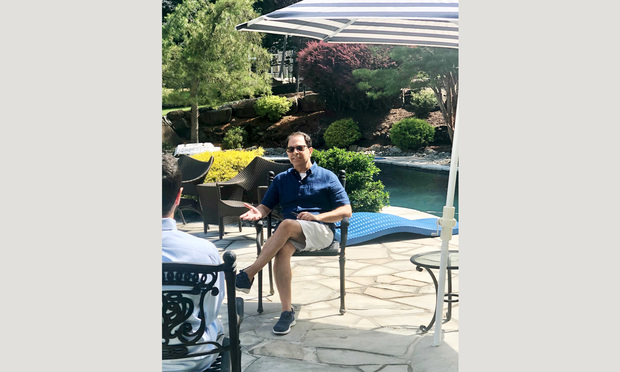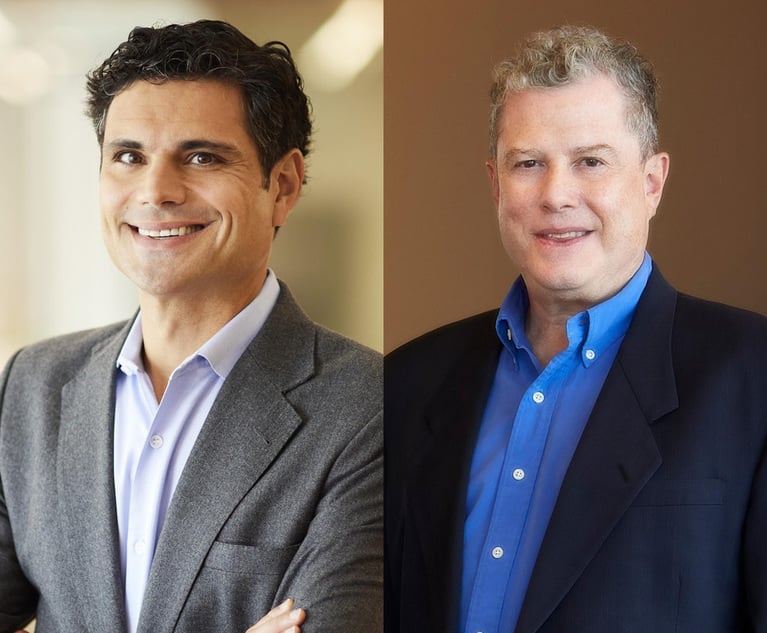Buoyed by Recent Gains, Firms Embrace Opportunistic Hiring Amid Pandemic
Strong finances and a willingness to invest for the future have kept some firms active in the lateral market, despite growing uncertainty over the financial impact of the coronavirus.
June 30, 2020 at 05:00 AM
7 minute read
The original version of this story was published on The American Lawyer
 Lowenstein Sandler managing partner Gary Wingens in a backyard meeting.
Lowenstein Sandler managing partner Gary Wingens in a backyard meeting.
In the last several weeks, Lowenstein Sandler managing partner Gary Wingens has started inviting potential new partners to his Livingston, New Jersey, backyard.
His firm is one of a number of those that have been actively pursuing laterals throughout the coronavirus pandemic. While for several months, conversations had unfolded purely virtually, the decreasing rates of infection in many parts of the country have allowed some new forms of person-to-person contact.
"They stay far away, and we take the masks off," Wingens said.
Mintz, Levin, Cohn, Ferris, Glovsky and Popeo managing partner Bob Bodian hasn't had one of these meetings yet, but he's comfortable with his partners getting to know their future colleagues this way.
"Each brought their own cocktails," he said of one such meeting. "It was self-serve."
Granted, these confabulations depend on firms having the wherewithal and desire to take on the costs and risks of adding new partners in the midst of the worst economic downturn since the Great Depression. And skyrocketing rates of COVID-19 infection in other parts of the country have left the timing of any recovery shrouded in uncertainty.
While some firms are feeling the pinch from declining demand, others are in a position to profit by looking opportunistically at talent that may be coming available.
"We have seen a category of firms that not only vowed to continue partner hiring but have doubled down on their strategic plans," Garrison & Sisson recruiter Dan Binstock said. "The leadership at these firms usually view obstacles as opportunities, and a thoughtful, but glass-half-full mindset is extremely compelling to lateral partners, especially in this current market."
And the decisions being made now are likely to have lasting effects that continue once a vaccine for the novel coronavirus is developed and business in the U.S. returns to some degree of normalcy.
"I think we're going to learn a lot about what they're made of, in terms of just how well run they are to begin with and how ambitious and aggressive they are in terms of improving their position in the market or maintaining it," Chicago-based recruiter Kay Hoppe said of firms in the current moment.
Several firms that have already signaled their ambitions with a series of big hires are drawing on lessons taken nearly a dozen years ago from the Great Recession.
Cozen O'Connor has hired aggressively for both transactional work and class action litigation, adding 25 attorneys, including eight shareholders since March 1. The firm pounced similarly in 2009, bringing on nearly 70 attorneys from crumbling Wolf Block.
"That was the worst economy of our lifetime," said executive chairman and CEO Michael Heller. "We were willing to make that investment, and it's paid off. We take that similar philosophy now when other firms are looking to tighten belts."
That included a bet on real estate, where work was not in high demand in the midst of the financial crisis.
"When no one wanted to touch real estate, [Cozen O'Connor] did touch real estate," Binstock said. "For years, they were benefiting from that."
Haynes & Boone, which has added 11 new partners and a total of 39 attorneys since the start of 2020, shows a similar history of opportunism. In 2009, the firm was able to consummate the acquisition of IP boutique MacPherson, Kwok, Chen & Heid following a four-year courtship, establishing a presence in California for the first time. The following year, it took just four weeks to seal the deal with a six-partner group of Paul Hastings partners in New York in which the firm long held interest.
That pattern repeated itself with the pair of life sciences partners Haynes & Boone brought on from McDermott Will & Emery to lead a new San Francisco office in April. Managing partner Tim Powers had met in person with the potential hires a week before the pandemic-related lockdowns began, and the firm had no trouble sealing the deal virtually.
"We've stuck with the plans that we've had, and we've been able to maximize those," Powers said. "Any time there is a market disruption and you are a beacon of stability within that disruption, you can show that stability."
Sound finances are critical, too. Haynes & Boone had its best first quarter in the firm's history, according to Powers, who added that the firm, which is celebrating its 50th anniversary, was already looking to grow moving into 2020.
Mintz, which announced the hire of a former Boies Schiller & Flexner partner Monday, had the benefit of closing its fiscal year March 31. According to Bodian, the firm beat its budget for equity partner profits by 25%. That allowed the firm to increase hold backs while keeping distributions above what would have been expected at budget. This follows a five-year spell where the firm is up 50% in both profits and revenues.
"We sort of hit the pandemic running," said Bodian, who promised several more announcements in the coming weeks.
Wingens, whose firm added a new head of life sciences transactions in late April, views the current moment as the start of a brand new economic cycle. That means a focus not just on the "practice of the moment," but those expected to grow in coming years, like privacy and cybersecurity, investment management and technology.
"We're trying to figure out where that proverbial puck is going, rather than where we are today in this somewhat surreal work world," he said.
That doesn't mean that the firm isn't looking to add bankruptcy attorneys, who are in demand practically everywhere. Wingens said that's also a goal, but that with 10% of the firm's head count in restructuring, it's already on sound footing.
Likewise, Haynes & Boone is targeting health care, IP and fund formation, among other areas.
"We're looking, for the long term, at what can build a great firm," Powers said.
Based in Dallas, where coronavirus cases are now surging, neither Powers nor his partners in the Texas-based firm have returned to live interviews since the start of the pandemic.
But in regions where the pandemic has peaked earlier, attorneys with transferable business operating out of struggling firms will likely have multiple opportunities to put on smart casual attire and a mask for meetings on park benches, outside cafes, or in someone's backyard.
"Personally, I feel there's some angst because I shouldn't offer the person coffee or food," Wingens said. "Aside from that, it's actually very pleasant, and the weather has been nice, so it works well."
Read More
With Economy on the Brink, Will the Lateral Partner Market Dry Up?
Are Bank Practices Finally Seeing a Rebound Amid the Pandemic Response?
Pandemic Slows Lateral Hiring as Firms Look for Guaranteed Winners
This content has been archived. It is available through our partners, LexisNexis® and Bloomberg Law.
To view this content, please continue to their sites.
Not a Lexis Subscriber?
Subscribe Now
Not a Bloomberg Law Subscriber?
Subscribe Now
NOT FOR REPRINT
© 2025 ALM Global, LLC, All Rights Reserved. Request academic re-use from www.copyright.com. All other uses, submit a request to [email protected]. For more information visit Asset & Logo Licensing.
You Might Like
View All
GOP Now Holds FTC Gavel, but Dems Signal They'll Be a Rowdy Minority
6 minute read
‘Diminishing Returns’: Is the Superstar Supreme Court Lawyer Overvalued?

Eighth Circuit Determines No Standing for Website User Concerned With Privacy Who Challenged Session-Replay Technology
7 minute read
Leaning Into ‘Core’ Strengths, Jenner’s Revenue Climbs 17%, Profits Soar 23%
4 minute readLaw Firms Mentioned
Trending Stories
- 1Legal Community Mourns the Loss of Trailblazing Judge Dorothy Chin Brandt
- 2Delaware Supreme Court, Reversing Chancery, Lowers Review Standard for TripAdvisor Move to Nevada
- 3Haynes and Boone Expands in New York With 7-Lawyer Seward & Kissel Fund Finance, Securitization Team
- 4Upstart Insurer That's Wowing Industry Hires AIG Legal Exec to Help Guide Global Expansion
- 5Connecticut Lawyers in Spotlight for Repping FBI Agents
Who Got The Work
J. Brugh Lower of Gibbons has entered an appearance for industrial equipment supplier Devco Corporation in a pending trademark infringement lawsuit. The suit, accusing the defendant of selling knock-off Graco products, was filed Dec. 18 in New Jersey District Court by Rivkin Radler on behalf of Graco Inc. and Graco Minnesota. The case, assigned to U.S. District Judge Zahid N. Quraishi, is 3:24-cv-11294, Graco Inc. et al v. Devco Corporation.
Who Got The Work
Rebecca Maller-Stein and Kent A. Yalowitz of Arnold & Porter Kaye Scholer have entered their appearances for Hanaco Venture Capital and its executives, Lior Prosor and David Frankel, in a pending securities lawsuit. The action, filed on Dec. 24 in New York Southern District Court by Zell, Aron & Co. on behalf of Goldeneye Advisors, accuses the defendants of negligently and fraudulently managing the plaintiff's $1 million investment. The case, assigned to U.S. District Judge Vernon S. Broderick, is 1:24-cv-09918, Goldeneye Advisors, LLC v. Hanaco Venture Capital, Ltd. et al.
Who Got The Work
Attorneys from A&O Shearman has stepped in as defense counsel for Toronto-Dominion Bank and other defendants in a pending securities class action. The suit, filed Dec. 11 in New York Southern District Court by Bleichmar Fonti & Auld, accuses the defendants of concealing the bank's 'pervasive' deficiencies in regards to its compliance with the Bank Secrecy Act and the quality of its anti-money laundering controls. The case, assigned to U.S. District Judge Arun Subramanian, is 1:24-cv-09445, Gonzalez v. The Toronto-Dominion Bank et al.
Who Got The Work
Crown Castle International, a Pennsylvania company providing shared communications infrastructure, has turned to Luke D. Wolf of Gordon Rees Scully Mansukhani to fend off a pending breach-of-contract lawsuit. The court action, filed Nov. 25 in Michigan Eastern District Court by Hooper Hathaway PC on behalf of The Town Residences LLC, accuses Crown Castle of failing to transfer approximately $30,000 in utility payments from T-Mobile in breach of a roof-top lease and assignment agreement. The case, assigned to U.S. District Judge Susan K. Declercq, is 2:24-cv-13131, The Town Residences LLC v. T-Mobile US, Inc. et al.
Who Got The Work
Wilfred P. Coronato and Daniel M. Schwartz of McCarter & English have stepped in as defense counsel to Electrolux Home Products Inc. in a pending product liability lawsuit. The court action, filed Nov. 26 in New York Eastern District Court by Poulos Lopiccolo PC and Nagel Rice LLP on behalf of David Stern, alleges that the defendant's refrigerators’ drawers and shelving repeatedly break and fall apart within months after purchase. The case, assigned to U.S. District Judge Joan M. Azrack, is 2:24-cv-08204, Stern v. Electrolux Home Products, Inc.
Featured Firms
Law Offices of Gary Martin Hays & Associates, P.C.
(470) 294-1674
Law Offices of Mark E. Salomone
(857) 444-6468
Smith & Hassler
(713) 739-1250








